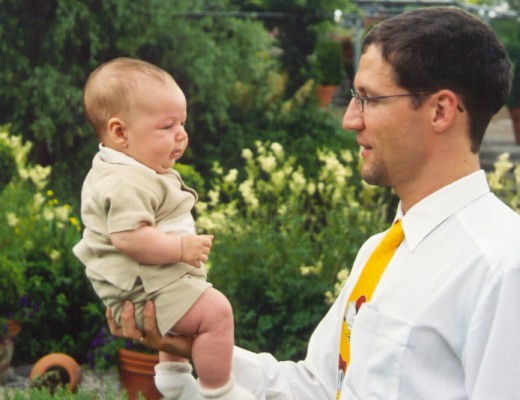Five Incredibly Stupid Things that Even Good Parents Sometimes Say to Their Kids

Parenting is easy. No, really, it is. All you have to do is keep the kid fed, clothed, sheltered, and safe. Oh, and teach the kid how to talk, and not to soil himself. That’s relatively easy stuff. Being a good parent? That’s really, really hard. It takes practice and discipline, you rarely get a break, and you never, ever get a vacation. But it’s the most important thing many of us will ever do. It’s not surprising that lots of parents, in moments of fatigue, frustration, or anger, say stupid stuff without thinking about it. Here are some of the stupid things that even good parents sometimes say, and why it’s not a great idea to say them.
“How Many Times Have I Told You Not To…?”
The kid has done that thing that you don’t like, that you’ve told him not to do, and that you have corrected him for doing on many previous occasions. You’re mad about it, and feel the need to vent. You hear yourself ask, “How many times have I told you not to drink the ketchup from the bottle (or whatever it is)!?” This is a silly thing to say for many reasons.
First of all, your kid is not deliberately trying to annoy you. Honest. He just did the thing again without thinking about the consequences. That’s the secret to most of the stupid stuff kids do: they usually don’t think about consequences. You’re frustrated at the disobedience, true, but the frustration is your problem, and as the adult, you need to be able to handle it.
Next, it’s an implied insult. It’s not as bad as explicitly calling the kid stupid, but think about what you’re implying when you ask “How many times have I told you…?” You’re asking why the kid can be told not to do the thing over and over again, and he still can’t manage not to do it? Wow, he must be some kind of fool, right? While younger kids don’t really understand subtext, implications, and other niceties of rhetoric, they do pick up on tone of voice and facial expressions. When you ask this question, you’re probably going to be sounding pretty disdainful, and you sure won’t be smiling. Remember, the goal is to correct the kid’s behavior. You want him to feel bad about what he did, not about himself.
Finally, until your kid reaches a certain level of social and intellectual development, he’s not going to really understand the concept of the rhetorical question. Sooner or later, this question—this insulting question that has no answer—is going to prompt him to say something in response. Depending on how clever the kid is (and whether the kid has realized that it’s a stupid question in the first place), he could answer anything from, “I don’t know,” to, “Oh, about a million,” to my personal favorite, “Heck, I didn’t know I was meant to be keeping track!”
Which brings us to the next thing you’ll probably say:
“Don’t Get Smart With Me!”
This is just confusing. Most of the time, you want the kid to be smart. You’ve even probably praised her for her intelligence when she figured out how to do something, or mastered the alphabet, or read one of Dr. Suess’s books out loud to you. She’s learned that smart is good, and she learned that from you. And now you’re telling her that it’s bad to be smart? How does that work?
What you’re really trying to tell your kid is that you don’t like her insulting tone, which is pretty hypocritical, since you just said a fairly insulting thing to her. Kids are big on fairness (ask any first-grade teacher). While your kid might not be able to articulate her thoughts, I guarantee you that she’ll notice the do-as-I-say-not-as-I-do nature of insisting that she speak respectfully to you while you’re saying disrespectful things to her.
I can already hear people scrolling past the rest of this article to rip me a new one in the comment section: “Kids have to respect their parents! The parent has to be in charge! You can’t let kids walk all over you!” Sure, sure, but think about this: what if your boss talked to you the way you talk to your kid? How would you feel about your boss? Would you respect your boss? Or resent her? Right.
Now think about this: Do you want your kid to respect you? Or resent you? Right.
You’re the grown-up, remember? You need to be able to master your frustration and not take it out on your kid. You’ll win the battle, certainly: you’re bigger, you’re stronger, and you control every aspect of your kid’s life, from what she gets to eat to what she gets to wear. But you might just lose the war: a resentful kid won’t ask—and certainly won’t follow—your advice later in life. She won’t come to you with her problems if she’s grown up feeling worse about herself after talking to you.
Treating your kid with respect doesn’t mean being a pushover. It means being clear (saying, “Don’t use that disrespectful tone” instead of, “Don’t be smart”) and consistent (don’t use a condescending tone when speaking to your kids).

“Stop That Or Else!”
“Or else” is the problematic part of this one. The kid doesn’t know what “else” might be. If your kid is curious by nature (and what kid isn’t?), he might keep doing it just to find out what will happen. And of course, your goal is to get him to stop, right? It’s better to give your kid a specific consequence for not stopping, and it’s much better to make the consequence directly relate to what the kid is doing. It’s best of all to give the kid an idea for something to do instead. For example, if he’s bouncing his superball in the living room, you could threaten to take the superball away, or you could say, “See the things your ball might knock over if you lose control of it? Can you think of a better place to bounce your superball?” Your kid will probably be able to think of a good place: maybe the driveway or the sidewalk.
If you must threaten a consequence, it should be specific, it should be logical, and above all, it should be plausible, unlike the following:
“If You Don’t Stop That, I’ll Turn This Car Around And We Won’t Go To Disney World”
Empty threats are excellent—for stripping yourself of authority. If your kids are really young, or you’ve only just left the house, maybe they’ll believe you when you threaten to turn the car around and spend your vacation in the backyard. But after the first hundred miles or so, the kids will figure out that you’ve gone far enough that you won’t turn back. If your kids are older, they’ll know that you’ve probably already made reservations or bought tickets or whatever, and they’ll know you won’t want to throw away all that money just to make a point. Your threat will be empty, and your kids will know it.
After a few of these empty threats (they don’t have to be about Disney World—they could be any threat that you’re not willing to carry out), your kids will stop believing your real threats, too. Or at least, they’ll be confused about which threats are real and which are empty. Depending on how much fun they’re having with whatever it is you want them to stop, they may decide it’s worth the risk. Eventually, you’ll end up having to actually punish your kids for disobedience pretty much every time, because they’ll stop responding to verbal correction.
This may make them cry, and you may be tempted to say:
“Stop Crying, Or I’ll Give You Something To Cry About!”
When I was a kid, I didn’t understand this at all. What was this mysterious something-to-cry-about that I was being offered? Whatever is was, I really didn’t need it: I clearly already had something to cry about—hence, the crying. And if you want me to stop crying, why the heck would you want to give me something that will make me cry? Crazy, right?
As an adult, having had experience with kids and the sometimes silly (to me) stuff they cry about, I can understand the sentiment behind this threat. The parent 1) doesn’t understand why the kid is upset over this seemingly trivial thing, 2) wishes the kid would get over it and move on, and 3) hates, hates, hates hearing that obnoxious, whiny tone in the kid’s voice! But it’s still a stupid thing to say.
The kid is already miserable. She’s looking to you for comfort, and you’re going to make her even more miserable? She’s going to see this as a betrayal.
Of course, you don’t want to reinforce the whining/crying at minor setbacks, either. So focus on what you want. Not just “for the kid to stop making that annoying sound right now,” but what you really want: a kid who can face a setback and deal with it in a positive way. When you’re a grown up, dealing with other grown-ups, crying won’t help you. Nobody will respect you if you’re always bursting into tears every time something goes wrong or you don’t get what you want. This is a little abstract for most kids, of course, so you have to explain it so she’ll understand. “I can see that you’re upset, but when you whine and cry, that doesn’t make people want to help you. Take some time to do your crying, and when you’re done, come see me. Tell me in a nice voice what you want me to do to help you, and I will.” And when she asks, do it. After a while, she’ll learn that crying gets her nowhere, while asking for help gets her what she wants. Once she’s learned that, she’ll probably spend less time crying and more time fixing her problems.
This is not to say that kids should never cry. Heck, I’m a grown man, and I wept at Rue’s (fictional!) death in The Hunger Games. It’s important to differentiate between crying over something that’s genuinely sad, and crying over minor setbacks. One should get sympathy and comfort. The other should get understanding, but no assistance at all until it’s over and the kid can ask—in a pleasant voice—for help.
What do you think about this?
What's your favorite silly thing people say to their kids?
We All Screw Up, But We Can All Fix It
Even the best parents lose their temper once in a while. Who hasn’t said or done something in a moment of frustration that they wish they could take back after they’ve calmed down? But you can fix your mistakes. Here’s the secret:
Say you’re sorry.
A lot of people think that parents should never apologize to their kids; that it undermines the parent’s authority or something like that. I completely disagree. When a parent (or any person) screws up, a couple things can happen. He can double-down on his error and look like a fool, or he can admit his mistake, apologize for it, and promise not to do it again—and in so doing, win greater respect.
Remember, when you apologize to your kid for losing your temper, you are not saying that whatever he did to make you mad was okay. What you’re saying is that you didn’t deal with his bad behavior in a good way, that you recognize this, and that you’ll figure out a better way to correct him when he screws up. You’re not letting him off the hook for being rude. You’re just letting your kid know that you don’t think it’s okay for you to be rude to him while correcting his rudeness.
Remember, too, that if you say you’re going to try to do better, you have to actually try to do better. The only hard-and-fast rule of parenting has two sides: never make a threat you aren’t prepared to back up; never make a promise you aren’t prepared to keep.
Some Supplemental Reading









